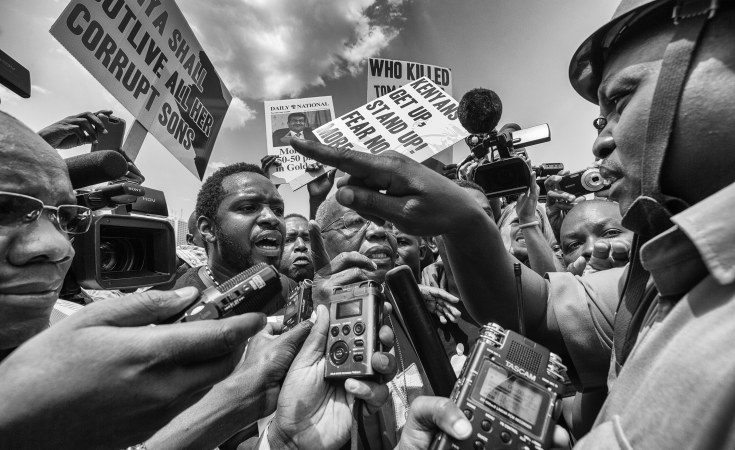Tomorrow, the world celebrates World Press Freedom Day, a day to recognize the courage and dedication of journalists who bring us vital information. But for many Ugandan journalists, this day serves as a stark reminder of the dangers they face in their daily work.
This is my story.
It was November 18th, 2020, during the riots that erupted after the arrest of opposition leader Bobi Wine. My cameraman and I were returning from an interview in Kawempe, a Kampala suburb. We witnessed the city engulfed in chaos - burning tires, blocked roads, and an atmosphere of fear.
Desperate to avoid the main roads, we took a detour through Kawempe-Nabweru road. A terrible mistake. We encountered roadblocks manned by rioters' intent on looting. Here, for the first time, I longed for the presence of police, a symbol of order that was nowhere to be seen.
Fearing for our lives, we sped through the roadblocks, dodging stones and sticks thrown by the mob. Just when we thought we were clear, we came across a group carrying Bobi Wine posters and large sticks. This wasn't a scene I ever thought I'd film - myself at the centre of it.
They recognized our car as belonging to a local TV station. We were surrounded. Panic surged through me. One man, with a menacingly large stone, demanded we get out. My cameraman, ever brave, tried explaining we were journalists, even wiping a Bobi Wine poster as they demanded.
They pulled me from the car by the collar, accusing us of working for a pro-government station. They were accusing us of working for a TV station that was owned by SK Mbuga, a well-known tycoon who is a staunch supporter of the government.
Mbuga had recently made headlines with comments in the media where he accused opposition leader Bobi Wine of wanting to destabilize Uganda and ignite unrest similar to what happened in Libya.
This accusation, along with our affiliation with Mbuga's TV station, fueled suspicion and hostility towards us. Just when all hope seemed lost, another man intervened, recognizing us as journalists.
He managed to negotiate our release, but not before they smashed the back windshield of our car.
The journey back to our office felt like an eternity. Traffic rules were non-existent, fear our only passenger. My car, battered and bruised, mirrored my own emotional state.
Later that day, on my way home, I encountered another incident - a colleague who witnessed the brutal shooting of a journalist by an LDU (Local Defense Unit) personnel. We were powerless to help.
We reached home that night under a cloak of silence, the media censored, the truth suppressed.
That day exposed a harsh reality - the Ugandan population often lacks a complete understanding of the role of the media. We are caught in the crossfire, disrespected by both the public and sometimes even our employers. But the biggest challenge is the lack of true media freedom in Uganda. Journalists critical of the government face harassment, intimidation, and even violence.
The legal system often fails to protect us, and cases of rights violations against journalists are rarely investigated or prosecuted.
Furthermore, low pay is pervasive in the industry. Many journalists struggle to make ends meet, forced to choose between financial security and pursuing investigative stories that may anger powerful figures. This economic vulnerability makes us even more susceptible to pressure and self-censorship.
World Press Freedom Day is a day to celebrate our resilience, but it's also a call to action. Uganda needs a media environment where journalists can work freely and safely, without fear of retribution. It's a call for the government to uphold its constitutional guarantee of press freedom, to investigate attacks on journalists, and to hold perpetrators accountable.
It's a call for media houses to prioritize the safety and well-being of their employees and offer fair compensation. Finally, it's a call for the Ugandan public to understand and appreciate the vital role journalists play in a healthy democracy.
We may not always be met with gratitude, but the pursuit of truth compels us forward. We will continue to report, to hold power accountable, and to bridge the gap between the public and their right to information.


